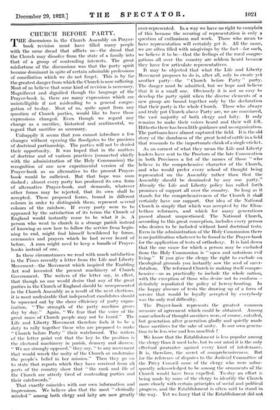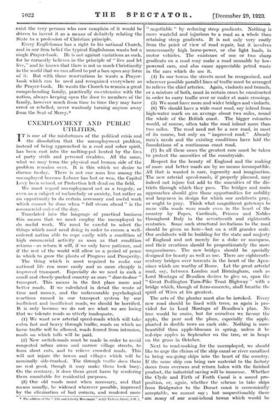CHURCH BEFORE PARTY.
THE discussions in the Church Assembly on Prayer- book revision must have filled many people with the same dread that afflicts us—the dread that the Church may dissolve from the state of a family into that of a group of contending interests. The great misfortune of the discussions was that the party spirit became dominant in spite of certain admirable professions of conciliation which we do not forget. This is by far the greatest danger from which the Church is now suffering. Most of us believe that some kind of revision is necessary. Magnificent and dignified though the language of the Prayer-book is, there are many expressions which are unintelligible if not misleading to a general congre- gation of to-day. Most of us, quite apart from any question of Church parties, would like to have those expressions changed. Even though we regard any change as a sacrifice, historical and sentimental, we regard that sacrifice as necessary.
Unhappily it seems that you cannot introduce a few changes without opening the floodgates to the passions of doctrinal partisanship. The parties will not be denied their opportunity. It was hoped that in the matters of doctrine and of various practices (connected chiefly with the administration of the Holy Communion) the recognition of one new experimental version of the Prayer-book as an alternative to the present Prayer- book would be sufficient. But that hope was soon dashed ; almost every party has produced its own form of alternative Prayer-book, and demands, whatever other forms may be rejected, that its own shall be accepted. These proposed forms, bound in different colours in order to distinguish them, represent several colours of the rainbow. If every party were to be appeased by the satisfaction of its terms the Church of England would instantly cease to be what it is. A person who went to church in a strange parish instead of knowing as now how to follow the service frci begin- ning to end, might. find himself bewildered by forms, ceremonies and prayers which he had never heard of before. A man might need to keep a bundle of Prayer- books instead of one.
In these circumstances we read with much satisfaction in the Times recently a letter from the Life and Liberty Movement—the Movement which inspired the Enabling Act and invented the present machinery of Church Government. The writers of the letter say, in effect, that though no one would desire that any of the great parties in the Church of England should be unrepresented in the Church Assembly as a result of the next elections. it is most undesirable that independent candidates should be squeezed out by the sheer efficiency of party organ- ization. " The strength of the party machine grows day by day." Again, " We fear that the voice of the great mass of Church people may not he heard." The Life and Liberty Movement therefore feels it to be a duty to rally together those who are prepared to make " Church before Party " their watchword. The writers of the letter point out that the key to the position is the electoral machinery in parish, deanery and diocese. " We are strongly opposed," they say, " to any movement that would wreck the unity of the Church or undermine the people's belief in her mission." Then they go on to state that reports which they have received from all parts of the country show that " the rank and file of the Church are utterly tired of contending parties and their catchwords."
That exactly coincides with our own information and impressions. We believe also that the most " clerically minded " among both clergy and laity are now greatly over-represented. In a way we have no right to complain of this because the securing of representation is only a question of enthusiasm and work. Those who mean to have representation will certainly get it. All the same, we are often filled with misgivings by the fact—for such, we believe it to be—that the feelings of the rural congre- gations all over the country are seldom heard because they have few articulate representatives.
It may be objected that what the Life and Liberty Movement proposes to do is, after all, only to create yet another party—the " Church before Party " party.
The danger must be admitted, but we hope and believe that it is a small one. Obviously it is not so easy to develop the party spirit when the diverse elements of a new group are bound together only by the declaration that their party is the whole Church. Those who always and truly put Church above Party are, we are convinced, the vast majority of both clergy and laity. It only remains to make their voices heard and their will felt.
Hitherto there has been little guidance and no organization.
The partisans have almost captured the field. It is the old story of the dumbness of the great herd of cattle in a field that resounds to the importunate chink of a single cricket.
As an earnest of what they mean the Life and Liberty leaders have sent to the Proctors of the late Convocation in both Provinces a list of the names of those " who believe in the comprehensive character of the Church, and who would prefer every school of thought being represented on the Assembly rather than that the Assembly should be dominated by any one party." Already the Life and Liberty policy has called forth promises of support all over the country. So long as it stands for the comprehensiveness of the Church it shall certainly have our support. Our idea of the National Church is simply that which was accepted by the Eliza- bethan reformers, and which for many generations passed almost unquestioned. The National Church, according to this great conception, includes every person who desires to be included without hard doctrinal tests. Even in the administration of the Holy Communion there is no justification whatever to be found in the Prayer-book for the application of tests of orthodoxy. It is laid down that the one cause for which a person may be excluded from the Holy Communion is " open and notorious evil living." If you give the clergy the right to exclude on theological grounds you instantly sow the seed of sacer- dotalism. The reformed Church in making itself compre- hensive—so as practically to include the whole nation, with the exception of those who desire not to conform— definitely repudiated the policy of heresy-hunting. In the happy absence of tests the drawing up of a form of service that would be loyally accepted by everybody was the only real difficulty.
The Prayer-book represents the greatest common measure of agreement which could be obtained. Among some schools of thought sacrifices were, of course, entailed, but generation after generation gladly and quietly made those sacrifices for the sake of unity. Is our own genera- tion to be less wise and less unselfish ?
We know that the Establishment is less popular among the clergy than it used to be, but to our mind it is the only effectual guarantee against every kind of intolerance. It is, therefore, the secret of comprehensiveness. But for the reference of disputes to the Judicial Committee of the Privy Council some of the clergy who were subse- quently acknowledged to be among the ornaments of the Church would have been expelled. To-day an effort is being made by some of the clergy to identify the Church more closely with certain principles of social and political progress, and the Establishment is often said to stand in the way. Yet we fancy that if the Establishment did not exist the very persons who now complain of it would be driven to invent it as a means of definitely relating the State to a profession of Christian principle.
Every Englishman has a right to his national Church, and in our firm belief the typical Englishman wants but a single Prayer-book. He is not against variations as such, for he earnestly believes in the principle of " live and let live," and he knows that there is not so much Christianity in the world that we can afford to put a ban upon any form of it. But with those reservations he wants a Prayer- book which can be used and recognized everywhere as the Prayer-book. He wants the Church to remain a great comprehending family, practically co-extensive with the nation, always keeping open the door to members of the family, however much from time to time they may have erred or rebelled, never wantonly turning anyone away from the Scat of Mercy.*



































 Previous page
Previous page